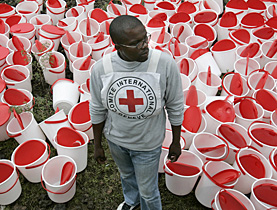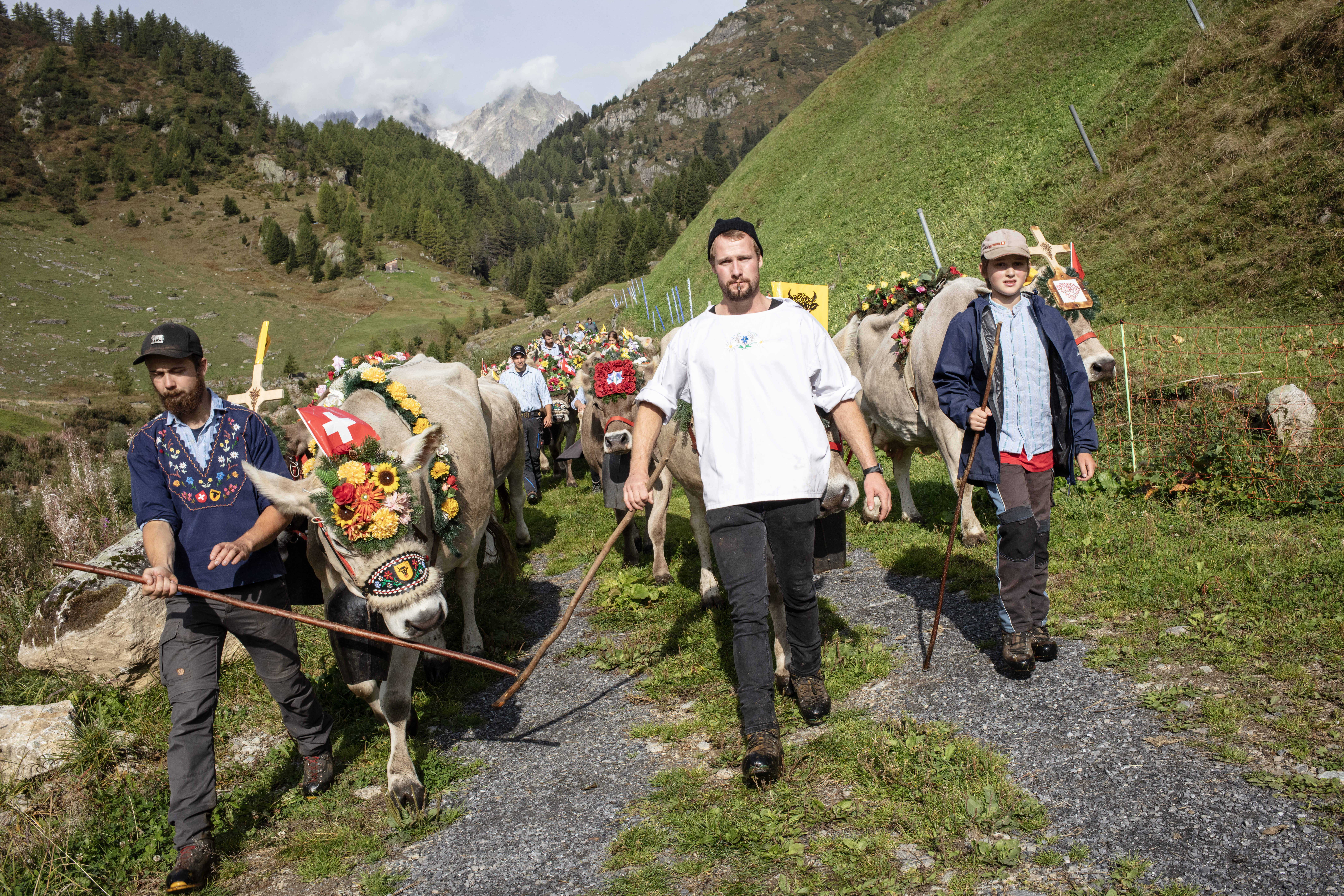
Who was the father of the Red Cross?

Henry Dunant is often described as a saintly humanitarian idealist who founded the Red Cross, yet the story of his life is little known and full of contrasts.
To mark World Red Cross and Red Crescent Day, swissinfo takes a look at the man behind the myth, who helped create the International Red Cross and Red Crescent Movement and initiate the Geneva Convention.
This article is part of a forthcoming swissinfo dossier devoted to the Red Cross, which this year is celebrating the 150th anniversary of the Battle of Solferino, the 90th anniversary of the birth of the International Red Cross and Red Crescent Movement, alongside the 60th anniversary of the Geneva Conventions.
“His name appears on street names and squares around the world, but we don’t really know him very well,” said Gerard A. Jaeger, Swiss author of a new biography, “Henry Dunant: l’homme qui inventa le droit humanitaire (the man who invented humanitarian law)”.
Different Dunants
Swiss playwright Michel Beretti, author of a play about Henry Dunant, agreed that it was hard to pin him down.
“If he’s a saint, he’s a funny kind of saint, as his personality and life is extremely contradictory,” he told swissinfo. “There are several different Dunants.”
Henry Dunant was born into a religious, humanitarian and civic-minded family in Geneva on May 8, 1828.
But he was not very gifted academically and was forced to leave the Collège Calvin in Geneva due to poor grades. He later took up an apprenticeship with a money-changing firm.
At the age of 26 he entered the business world as a representative of the Compagnie Genevoise des Colonies de Sétif in North Africa and Sicily. He went on to devise a financial scheme to make his fortune, making himself president of the Financial and Industrial Company of Mons-Gémila Mills in Algeria to exploit a large tract of land.
Needing water rights, he came up with the audacious idea of asking Emperor Napoleon III directly. At the time Napoleon was in the field directing the French armies who, with the Italians, were trying to drive the Austrians out of Italy.
Violent shock
Dunant made his way to Napoleon’s headquarters near the northern Italian town of Solferino and by chance arrived there in time to witness, and to participate in the aftermath of the Battle of Solferino.
This was a violent confrontation between the Franco-Sardinian Alliance and the Austrian army for the independence of Italy that was fought on June 24, 1859 near Lake Garda in northern Italy.
When the fighting had subsided, over 40,000 soldiers lay dying on the battlefield, many suffering from horrendous injuries.
The Geneva businessman was deeply affected by the butchery and, with help from local people, organised first aid for the wounded and sick.
“This was a shock and deep psychological wound for him, from which he would never recover,” said Beretti.
Back home, Dunant wrote a book about his experiences, entitled A Memory of Solferino, and developed the idea of an organisation to assist the war wounded as a contribution towards creating a more civilised world and alleviating the sufferings of war.
Geneva committee
In 1863, with his experience of the slaughter of Solferino still fresh in his mind, Dunant and four Swiss acquaintances created a committee that would later become the International Committee of the Red Cross (ICRC).
Beretti laughs about this Geneva creation.
“The beginning of the Red Cross is absurd when you think about it,” he said. “Five guys who decide to meet in an apartment in Geneva Old Town to found an international organisation. It’s incredible. You really need Geneva pretentions for that kind of thing.”
One year on, with the support of the five founding ICRC members, the Swiss government organised a diplomatic conference attended by 16 states, which led to the signing of the first Geneva Convention.
The treaty fixes limits to the rules of war, establishing the humanitarian treatment of battlefield casualties and adoption of a special identifying emblem – in virtually all instances a red cross on a field of white.
Bankrupt outcast
For Dunant the next 30 years stood in stark contrast to this earlier period, however.
His businesses in Algeria had suffered, partially because he had devoted too much time to his humanitarian pursuits. In April 1867, the bankruptcy of the financial firm Crédit Genevois led to a scandal involving Dunant. He was forced to declare bankruptcy and was condemned by a Geneva court on August 17, 1868 for deceptive practices in the bankruptcies.
After the disaster, which involved many of his Geneva friends, Dunant became a social outcast and within a few years he was literally living like a beggar.
“[Co-founder] Gustave Moynier thought the bankruptcy and Dunant’s bad reputation in Geneva would damage the image of the new Red Cross, so he distanced Dunant from the committee,” said Jaeger.
In 1875 Dunant left the city, profoundly disappointed, and eventually settled in Heiden, a small village in canton Appenzell Outer Rhodes.
“This was a huge wound for him as he was convinced of the sincerity and need for his humanitarian work,” said Jaeger.
As he was ill, Dunant was moved in 1892 to the hospice at Heiden. And here, in Room 12, he spent the remaining 18 years of his life.
“People thought he was dead,” said Jaeger. “During this time the ICRC continued to work and develop on its own without him.”
Rehabilitation
But he was not totally unknown. In 1895 German journalist Georg Baumberger wrote an article about Dunant, which was picked up by the world’s press and catapulted him back into the public eye.
In 1901, Dunant was awarded the first-ever Nobel Peace Prize for his role in founding the International Red Cross Movement and initiating the Geneva Convention.
He died on October 30, 1910 and was buried in Zurich without ceremony.
But official congratulations from the ICRC for the Nobel Peace Prize seemed to secure the final rehabilitation of Dunant’s reputation.
“There is no man who more deserves this honour, for it was you, 40 years ago, who set up the international organization for the relief of the wounded on the battlefield. Without you, the Red Cross, the supreme humanitarian achievement of the nineteenth century would probably have never been undertaken,” it wrote.
Without Dunant the other four founders of the Red Cross would never have gone so far, said Jaeger.
“Dunant’s dynamism and obsession meant that things went much faster. Fifty years later the Red Cross would probably have occurred elsewhere, but he simply accelerated history,” he said.
“He was an idealist, but someone who wanted to give concrete expression to his ideals.”
swissinfo, Simon Bradley
The network has three components.
The International Committee of the Red Cross (ICRC), founded in Geneva in 1863, operates worldwide, helping the victims of war and internal violence, acting as a neutral mediator in cases of conflict, and promoting knowledge and respect for humanitarian law.
The ICRC’s headquarters are in Geneva and the organisation has more than 12,000 staff in 80 countries around the globe.
There are 186 National Red Cross and Red Crescent Societies around the world, which form the backbone of the International Red Cross and Red Crescent Movement. Each national society is made up of volunteers and staff, who provide a wide variety of services, ranging from disaster relief and assistance for the victims of war, to first aid training and restoring family links.
The national societies are grouped in the International Federation of Red Cross and Red Crescent Societies, which was founded in Paris in 1919.
The federation promotes the humanitarian activities of national societies among vulnerable people. By coordinating international disaster relief and encouraging development support it seeks to prevent and alleviate human suffering. It also has its headquarters in Geneva and oversees 1,300 staff worldwide.
Worldwide, there are around 100 million Red Cross and Red Crescent staff, members and volunteers.

In compliance with the JTI standards
More: SWI swissinfo.ch certified by the Journalism Trust Initiative






























You can find an overview of ongoing debates with our journalists here . Please join us!
If you want to start a conversation about a topic raised in this article or want to report factual errors, email us at english@swissinfo.ch.